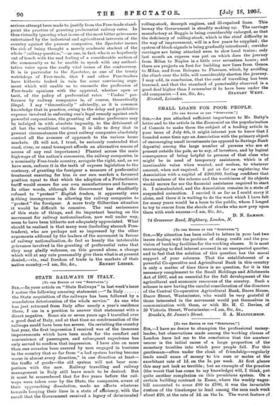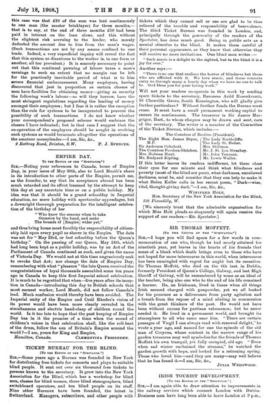[TO THY EDITOR OF THZ "SPECTATOR:1
SIR,—I have no desire to champion the professional money- lender, but observations made among the working classes of London have led me to the conclusion that the amateur usurer is the initial cause of a large proportion of the monetary troubles into which poor people fall. For this gentleman—often under the cloak of friendship—regularly lends small sums of money to his men or mates at the exorbitant rate of id. on the is. per week. At first glance this may not look so terrible ; but an example of the practice (the worst that has come to my knowledge) will, I think, put quite another complexion on this pernicious system. On a certain building contract in Essex, where the weekly wages- bill amounted to some £80 to 2100, it was the invariable custom of the timekeeper to lend among the men each week about 020, at the rate of id. on the is. The worst feature ?f this case was that 210 of the sum was lent continuously to one man (the master bricklayer) for three months,— that is to say, at the end of three months £10 had been paid in interest on the loan alone, and this without the slightest risk accruing to the lender, who merely deducted the amount due to him from the man's wages. (Such transactions are not by any means confined to one trade. Indeed, a very superficial inquiry will reveal the fact that this system so disastrous to the worker is, in one form or another, all too prevalent.) It is scarcely necessary to point out that this continual pawning of labour taxes a man's earnings to such an extent that no margin can be left for the practically inevitable period of what is to him severe financial embarrassment. Many employers, having discovered that just in proportion as certain classes of men have facilities for obtaining money—giving as security the following week's labour—so will they borrow, have the most stringent regulations regarding the lending of money amongst their employees; but I fear it is rather the exception than the rule for systems to be inaugurated to prevent the possibility of such transactions. I do not know whether your correspondent's proposed scheme would embrace the classes I have indicated; but in that case I suggest that the co-operation of the employers should be sought in evolving such systems as would terminate altogether the operations of the amateur moneylender.—I am, Sir, &c., 9 Battray Road, Brixton, S.W. P. J. SPENCER.







































 Previous page
Previous page